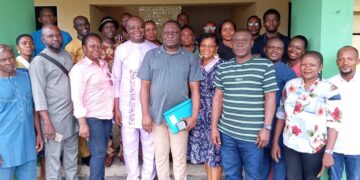The Cross River State Project Coordinating Office of the International Fund for Agricultural Development assisted Livelihood Improvement Family Enterprises for the Niger Delta, IFAD LIFE-ND Project recently inaugurated the Private Extension Service Providers (PESP) and the Private Rural Institution Service Providers (PRISP) at the premises of the State Project Coordinating Office, situated at the Cross River State Agricultural Development Programme – CRADP, Calabar.
Declaring the event open, the State Project Coordinator, Mr. Innocent Ogbin describes the event as a step in the right direction towards providing support and innovations to all the incubatees and other farmers within the coverage of Private Extension Service Providers (PESP) and the Private Rural Institution Service Providers (PRISP). He noted that, the gap between the Agricultural Extension services and farm-family household has become very wide making it difficult for improved agricultural technologies and information to get to the rural farmers as at when due.
The State Project Coordinator, noted that, the trend has negatively impacted on the overall wellbeing of the farmers. That, in addressing key performance gaps and improving productivity of the ubatees and other farmers within the area of coverage of PESP and PRISP the incubatees must be strengthen in agricultural technology and most impactful practices.
While preparing the minds of the Service providers to the enormous tasks ahead, Mr. Ogbin pointed out that, the broad objective of the Project is to give LIFE to the communities and beneficiaries through focal engagement in profitable agricultural enterprises that enhances income, ensure food security and job creation for beneficiaries.
The State Project Coordinator, further advised, the Service provider on work ethics if expected results must be achieved. “The project recognizes and imbibe team spirit for mutual and collective achievement of organizational goal. The birth of IFAD/LIFE-ND Project is the collaborative effort between the Federal Government, IFAD, NDDC and the State which had catalyzed the current achievement”. He stressed on the need for service providers to emulate the synergy at the State and National levels for the realization of outputs at the Local Government and community level. “As service providers you must liaise with the Desk officers and beneficiaries in a conducive and harmonious working environment”.
The State Project Coordinator, pointed out that, the absence of sustainability in most interventions is largely attributed to the absence of structures with capacity to transfer improved agricultural technologies and, knowledge base practices in the communities.
Explaining further, the State Project Coordinator, describes the PESP and PRISP as the fillers or leeway to the farmers and beneficiaries on Agricultural best practices.
He stated that, the project’s commodities and their value chains, the main streaming areas of nutrition, environment/climate change and the financial inclusion are critical factors for improved wellbeing and livelihoods of the people.
“The narrative about agriculture as an impoverishing business venture must change. We need to make our people change from subsistence agriculture or hand to mouth agriculture which didn’t do us any good to the business aspect of agriculture”, he concluded.
To bring a better understanding of implementation strategies to the PESP and PRISP, the State Rural institution Gender and Youth Officer, Mrs. Ewor Myke Edet, spoke on the project’s acronyms, the formation of structures and existence of some institutional committees, work ethics and general management of incubatees and farmers.
The State Agribusiness Project Officer, Mrs. Helen Effiom explained, the incubation model of the Project and, define the term ‘incubator and Incubatee’ as akin to the mentor and mentee. She also spoke on the need for the incubatees to see agriculture as business. Mrs Effiom, further inform the service providers that, the beneficiaries have already been trained and most of them have started their businesses already. She also emphasized on the aspect of monitoring which cuts across all the aspects of the project.
Dr. Friday Idiku, Lead Consultant for Private Extension Service Providers in his remarks describes the PESP and PRISP jobs as a call to service. He advised the Extension workers to follow laid down protocols and do more of encouraging the farmers. He impressed upon the extension workers to follow the four key areas of Service, Strengthening, Financial Inclusion and Sustainability. He concluded by advising the extension workers to seek clarification wherever there are doubts.
Dr. Nyiam, Matthew Eno, Lead Consultant, Private Rural Institution Service Providers also advised, the extension workers to take their jobs seriously and offer the best. Charging them to talk less but listen more with this mindset. Emphasizing that, “you will identify issues with ease. See this as a learning point to better yourselves”. He concluded.
In a brief response, Egbara Godfrey and Patience Ntui on behalf of the team thanked IFAD LIFE ND Project for the opportunity to serve and to contribute in the fight against food insecurity and sustainability, Agribusiness Promotion and Financial Inclusion. They promised to swim in the flow of unity, synergy and bond as expressed and evidence in the LIFE-ND Project in order to achieve the expected success.
The inauguration broke out into questions and answer sessions, and photo sessions and concluded with the assurance of periodic reviews, monitoring of progress and impacts assessment.











